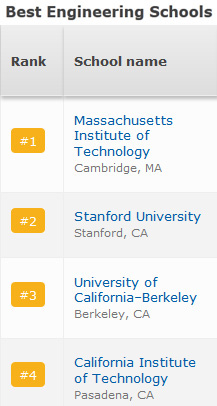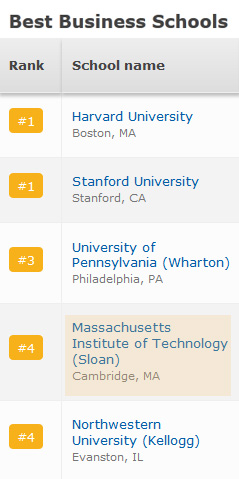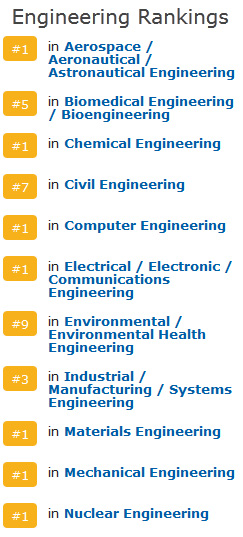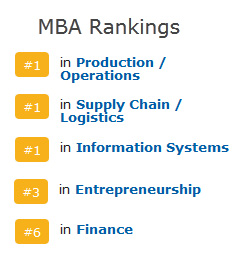The Streak Continues: MIT's Grad Engineering Program again Tops Rankings
-
-
slice.mit.edu
Filed Under
Recommended
 In case you were holding your breath about the U.S. News & World Report graduate school rankings, you can rest easy now. MIT has retained its top spot as the best engineering school nationwide—a position it's held since the graduate engineering rankings began in 1990.
In case you were holding your breath about the U.S. News & World Report graduate school rankings, you can rest easy now. MIT has retained its top spot as the best engineering school nationwide—a position it's held since the graduate engineering rankings began in 1990.The MIT Sloan School of Management tied for fourth with Northwestern's Kellogg School of Management in the top MBA programs category.
Scroll down and look at the graphics to see what other schools are at the top, as well as rankings for various specialties.
Last year, MIT ranked first in four engineering disciplines. This year that number jumped to seven.
How are the rankings determined?
Professional school programs in business, education, engineering, law, and medicine are ranked annually. Other disciplines are reviewed periodically. The rankings are based on "expert opinions about program excellence and statistical indicators that measure the quality of a school's faculty, research, and students," according to the U.S. News website.
Engineering Methodology
In fall 2012/winter 2013, appropriate data were collected from 191 schools out of 199 surveyed. Rankings were calculated based on a weighted average of 10 indicators below. Read about the methodology.Quality assessment (weighted by 0.40)
- Peer assessment score (0.25)
- (Corporate/company) recruiter assessment score (0.15)
- Mean GRE quantitative scores (0.0675)
- Acceptance rate (0.0325)
- Student-faculty ratio: Full-time doctoral students to full-time tenured or tenure-track faculty (0.075) and full-time master's students to full-time tenured or tenure-track faculty (0.0375) in fall 2012.
- Percent of faculty in the National Academy of Engineering (0.075)
- Doctoral degrees awarded (0.0625)

Research activity (weighted by 0.25)
- Total research expenditures (0.15)
- Average research expenditures per faculty member (0.10)
Business Methodology
In fall 2012/winter 2013, 140 master's programs in business provided sufficient data to calculate the MBA rankings, out of 448 surveyed. Rankings were calculated based on a weighted average of the indicators below. Read about the methodology.Quality assessment (weighted by 0.40)
- Peer assessment score (0.25)
- Recruiter assessment score (0.15)
- Mean starting salary and bonus (0.14)
- Employment rates for full-time master's program in business graduates: Employment rates at graduation (0.07) and three months after graduation (0.14) are used

Student selectivity (weighted by 0.25)
- Mean GMAT and GRE scores (0.1625)
- Mean undergraduate GPA (0.075)
- Acceptance rate (0.0125)
Specialty rankings for engineering are based solely on the peer assessments by department heads in each specialty area. Specialty rankings for business are based on ratings by business school deans and directors of accredited master's programs from the list of schools surveyed. They were asked to nominate up to 10 programs for excellence in each of the areas listed.







